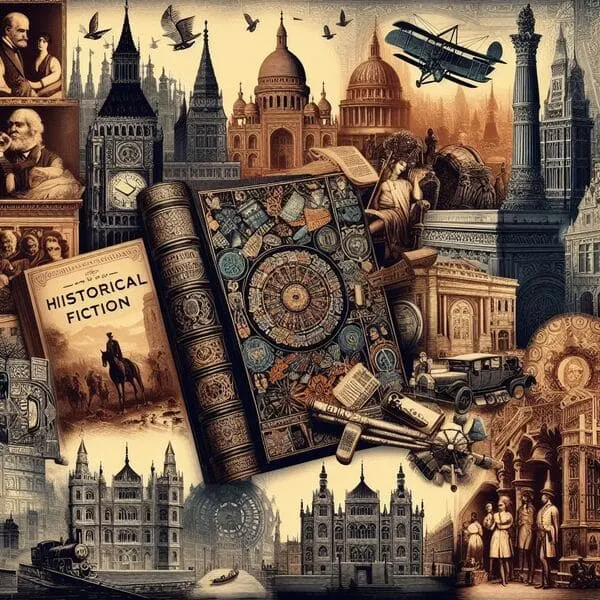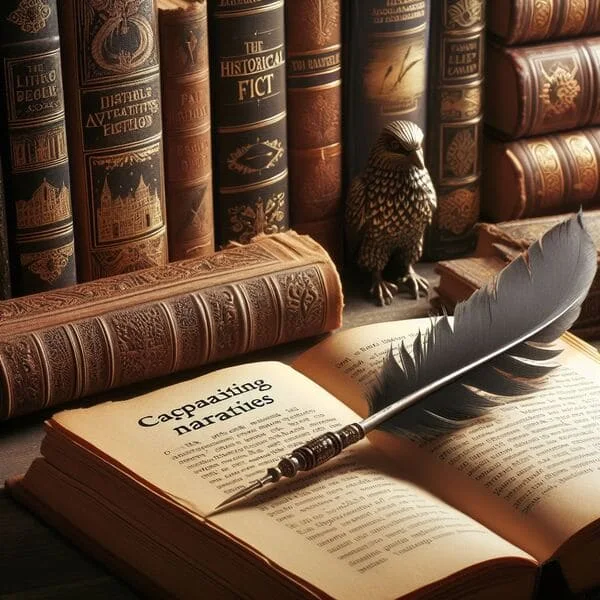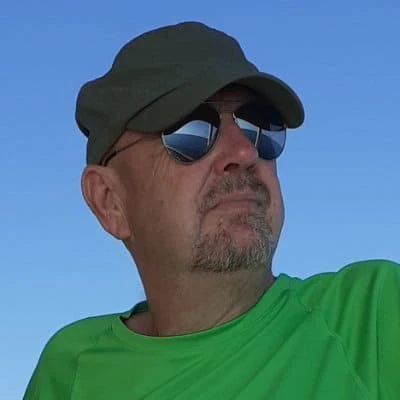Author Interview 003: Tom Kane - Exploring Historical Fiction and Literary Influences
In this exclusive interview, we delve into the creative mind of Tom Kane, an English author whose diverse experiences have shaped his journey from a career in technology to becoming a published writer. Kane's passion for storytelling is evident in his historical fiction trilogy, where he skillfully combines elements of humor, drama, and profound insights into the human condition.
Delving into Historical Fiction: An Exclusive Interview with Tom Kane
Tom Kane's journey from a career in technology to becoming a published author is as unique as it is inspiring. Influenced by his mother's love for writing and a childhood filled with Monty Python and science fiction, Kane's literary endeavors have led him to explore historical fiction with depth and authenticity. Through his trilogy—The Brittle Sea, The Brittle Land, and The Brittle Sky—Kane offers readers a captivating glimpse into the struggles of individuals amidst historical upheavals.
Featured Excerpts:
- Tom Kane, reflecting on his mother's influence on his writing journey, remarked, "My mother always wanted to be a writer, but never had the time or the technology. So, at an early age, mostly to please my mother, I started writing stories and she encouraged me all the way."
- Discussing the balance of humor in historical fiction, Kane humorously noted, "It's the Monty Python wannabe in me. If I see an opening for a little humor in the scene, I can't resist but to write it as I see it."
- Explaining the inspiration behind the trilogy's titles, Kane shared, "The theme is the struggle of the individual to overcome adversity... And I had my title."
Related post: Calling All Writers: Free Author Interviews! (2024)
Full Questions and Answers:
1. You've mentioned that your mother inspired you to write. Can you tell us a bit more about her influence on your writing journey?
My mother always wanted to be a writer but never had the time or the technology (a typewriter) to put down her ideas into a book. She loved reading and enjoyed films, so it was natural for me to become an extension of her desires. So, at an early age, mostly to please my mother, I started writing stories and she encouraged me all the way.
2. Your love for science fiction, particularly Doctor Who and Isaac Asimov, is evident. How have these influences shaped your approach to storytelling?
I don't try to emulate the writing style with the exception of Asimov's simple style of explaining complicated ideas. With Doctor Who, it was created as a vehicle to teach history, and that is such a wonderful concept. And to be honest, science fiction allows you to expand a story into infinity. I have one novel almost completed, but my historical novels have got in the way of me writing and publishing science fiction stories. But I'm working on it.
3. Monty Python's influence on your inclination towards silliness is quite intriguing. How do you balance humor with the serious themes often present in historical fiction, as seen in your trilogy?
If I see an opening for a little humour in the scene, I can't resist but to write it as I see it. It's like a little movie scene that pops into my head. I sometimes wonder if there's a higher intelligence at work in most writers' heads, and that has just played out a silly scene in my head of writers being manipulated like puppets on a string. It's the Monty Python wannabe in me.
4. Your journey from a special director in an office to a computer programmer and finally a writer is quite unique. How have these diverse experiences informed your writing style and the stories you choose to tell?
In my career, I have seen and experienced a lot of new technology, like the personal computer, coming to the fore and people often struggling to grasp these new working realities. I took to all my career paths like a duck to water and I think it was technology that paved my way to becoming a novelist. I went from paper, to computer seamlessly and the wannabe author in me embraced the IT age.
5. The titles of your trilogy—The Brittle Sea, The Brittle Land, and The Brittle Sky—are quite evocative. What inspired these titles, and can you give us a glimpse into the overarching themes of the trilogy?
The theme is the struggle of the individual to overcome adversity, to rise above that which is trying to suppress the individual, be it another human, circumstances or mental health issues as with the Magda/Maggie character. The titles came from a book I was reading about the Carpathia, one of the resue ships in the Titanic tradegy. It occured to me that maybe there could have been an instance of someone who survived, but wasn't rescued. How would it have been for them if they saw the last ship leave and all around them was broken ice and debris, how brittle was there demise. And I had my title.
6. You've mentioned that one of your goals was to write and publish a book. How does it feel to have accomplished this goal, and what advice would you give to aspiring writers who are just starting their journey?
It was a magical moment. Sheer delight mixed with a feeling of achievement, my own version of climbing Mount Everest. I have to admit I cried when I finished writing it and had a tearful moment when the proof arrived. I'll bet a few indie authors have had similar experiences.
7. Can you give us a glimpse into any upcoming projects or ideas you're currently working on? What can readers expect from you in the future?
I will be publishing another trilogy starting in the spring, with Walking Away from Midnight. Like The Brittle Sea, it started out life as a standalone as now has two sisters, Midnight's Child and Midnight's Secret. Again historical fiction, all three are set during World War II in France. I won't give the game away but there are excerpts of the first book to read on my website, here.
8. As an English author, you must have a deep appreciation for the rich literary tradition of your homeland. Could you share with us some of your favorite works from English literature and what makes them stand out to you?
If you mention Charles Dickens to most English speaking people, the obvious comes to mind, A Christmas Carol. But my favourite is A Tale of Two Cities. I love the period in which Dickens found himself and as a writer there were rich pickings on the trials and tribulations of everyday life. Oddly enough, one of my favourite writers is not English, and that's Bill Bryson, an American. His books are both entertaining, funny and educational. Not an easy mixture to achieve, but Bryson does it with style.
9. What historical fiction novels do you consider exemplary in the genre, and how have they influenced your own writing approach and storytelling techniques?
I have to admit, I have only ever read Dickens in historical fiction and as I mentioned in an earlier answer, A Tale of Two Cities is a fabulous novel. If I have followed anyone, it's Charles Dickens and his influence has been monumental in my approach to writing in that genre. And it really is pure luck that led me to writing historical fiction. As for technique, I just sit down at my laptop and let it flow. Once I'm in the zone, anything can happen and often does in the world I'm creating.
Conclusion
We extend our heartfelt thanks to Tom Kane for sharing his insights and experiences with us. His journey from a working-class upbringing to becoming a published author is a testament to the power of perseverance and passion. We eagerly anticipate his upcoming projects and encourage readers to explore his captivating historical fiction trilogy.











I've read his historical fiction and enjoyed it very much. I'm excited to hear he is also writing Sci-fi. I'll be watching for it. Thanks for this interview!
Great to hear and thanks.